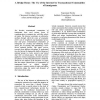Free Online Productivity Tools
i2Speak
i2Symbol
i2OCR
iTex2Img
iWeb2Print
iWeb2Shot
i2Type
iPdf2Split
iPdf2Merge
i2Bopomofo
i2Arabic
i2Style
i2Image
i2PDF
iLatex2Rtf
Sci2ools
103
click to vote
HICSS
2006
IEEE
2006
IEEE
A Bridge Home: The Use of the Internet by Transnational Communities of Immigrants
For decades transnational communities of immigrants have used various forms of communication to maintain ties with their places of origin. The Internet constitutes an alternative medium through which the sense of community (SOC) can be reinforced and maintained across time and space. Transnational communities of immigrants are creating and enhancing virtual spaces for (re)creating and maintaining a SOC across national borders. This paper reviews research from different disciplines to understand how the Internet is shaping the ability of dispersed national groups to create, preserve and extend their SOC in virtual spaces. The theory of SOC applied to virtual communities provides the frame of reference in which this phenomenon is analysed. Based on our analysis of the literature we argue that the unique characteristics of communities of immigrants—such as shared histories, experiences, common country of origin, and offline interaction—shape the nature and dynamics of their interacti...
Biometrics | Decades Transnational Communities | HICSS 2006 | System Sciences | Transnational Communities | Virtual Spaces |
| Added | 11 Jun 2010 |
| Updated | 11 Jun 2010 |
| Type | Conference |
| Year | 2006 |
| Where | HICSS |
| Authors | Celene Navarrete, Esperanza Huerta |
Comments (0)

